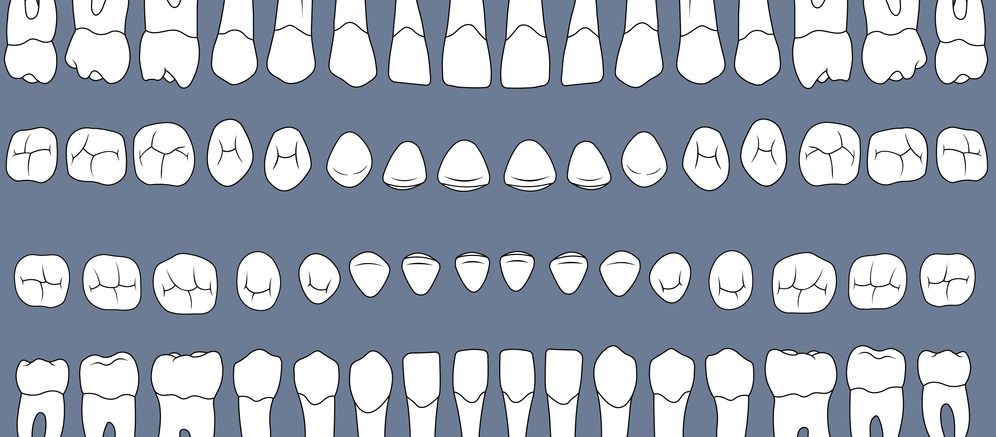Teeth Eruption Timetable For Baby And Adult Teeth
Teeth Eruption Timetable For Baby And Adult Teeth
Teething. It’s every parent’s nightmare but an essential part of childhood growth and development. The following teeth eruption timetable will help to give you an idea of when and what to expect with your child’s teething.
Like any milestone, the teeth eruption timetable is a rough guide; some children will teeth earlier or later than others. Some babies are already sporting a few shiny white teeth when they’re born!
Baby vs adult teeth
For most babies, their very first tooth will emerge around 6-8 months of age. They tend to emerge in pairs at either the top or the bottom. As a general rule, there will be four teeth erupting every six months until they have a total of twenty baby teeth: ten in the top and ten in the bottom at around the age of three.
Baby teeth are also referred to as primary or deciduous teeth and will begin to slowly fall out, making room for permanent adult teeth from the ages of six to thirteen. The very last adult teeth to emerge, usually between seventeen to twenty one years of age, are the third molars or wisdom teeth. There are thirty two permanent adult teeth.
Baby or primary: 6 months to 3 years
Baby or primary teeth usually begin to emerge in pairs around the age of 6 months. The very first teeth that break through your baby’s gums between 6-10 months will typically be both front bottom teeth, known as central incisors. Their matching top central incisors should be the next teeth to emerge around 8-12 months.
The teeth on each side of the front incisors, called the lateral incisors, are next to break through. This starts with the top pair this time, around 9-13 months, shortly followed by the bottom lateral incisors between 10-16 months.
Next come the canine or cuspid teeth between 16-23 months. The upper canines will usually erupt first, followed quickly by the bottom pair. Then come the very first set of molars at 13-19 months.
Finally, the second molars are the last on the teeth eruption timetable and appear between 2 to 3 years. Then there’s a break of three to four years before the adult teeth begin to appear.
Adult teeth: 6 to 12 years
Shortly after the age of four, you’ll probably start to notice some major changes in the shape of your child’s face and gaps appearing between their baby teeth. This is due to their jaw and facial bones growing and creating space in their jaw for their thirty two permanent adult teeth, which begin to appear around the age of six to seven.
Baby or primary teeth slowly begin to fall out in the order that they first appeared. Between the ages of about six to twelve your child will have a mix of adult and baby teeth.
Baby teeth will begin dropping out and adult teeth emerge in the following order:
- 6-7 years: first molars (these first adult teeth don’t replace baby teeth so it’s important to start caring for them properly as soon as they emerge to ensure that they last your child a lifetime)
- 7-8 years: central incisors (front teeth at top and bottom)
- 8-9 years: lateral incisors (top and bottom teeth on each side of the central incisors)
- 10-12 years: first premolars or bicuspids
- 11-12 years: second premolars or bicuspids
- 12-13 years: second molars.
Wisdom teeth: 17 to 21 years
The very final adult teeth on the teeth eruption timetable are the dreaded wisdom teeth or third molars, which generally put in an appearance between seventeen and twenty one years of age.
Taking care of baby teeth is important
If baby teeth are only expected to last your child a few years, why is it so important to look after them? Caring for your child’s baby or primary teeth is essential for a few key reasons:
It creates healthy habits to ensure that their adult teeth will be well looked after and last a lifetime.
Baby teeth aid in speech development.
Missing or decayed baby teeth can impact upon your child’s nutrition by creating food aversions.
Decay or infection in baby teeth can cause dark spots to develop on their adult teeth forming beneath the affected tooth or teeth.
If you’re concerned about either the health of your child’s teeth or that they’re not meeting the expected teeth eruption timetable, you should make an appointment with a dentist who specialises in working with children.
The team at Robert Duhig Dental are known as the ‘Gentle Dentists’ and will make your child’s first visit to the dentist a fun and exciting experience for everyone. They’re experienced, family dentists who can tell you all you need to know about the teeth eruption timetable.

